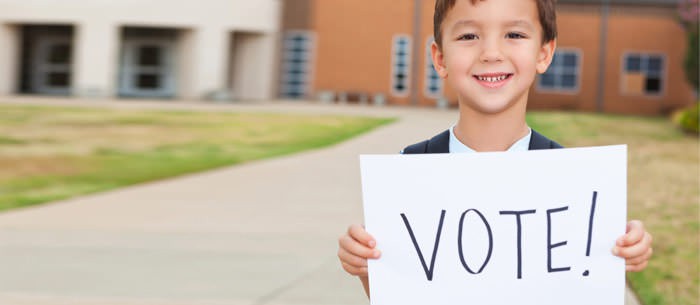Politics is an everyday topic of conversation in Stefanie Clarke’s house. The Superior, CO mom of two (ages 5 and 11) is active in politics as a professional and a volunteer, so her kids have attended campaign rallies and watched debates. But, most importantly, Clarke talks to the kids about which candidates she supports and why, emphasizing issues kids can relate to, like improving schools and making sure everyone can see a doctor. “I could never be impartial about the issues I care about so deeply,” Clarke says. “I want my children to be compassionate, thoughtful, open-minded people, and that means sharing my political ideology with them.”
While Clarke may be a strong communicator on this front, many parents are confused about what, how or even if to tell their kids about politics. And what if their nanny has a different political POV? But turn on the television, drive through your neighborhood, engage in social media and you can’t escape it – and neither can your kids.
Effective ways to talk to you kids do exist – whether you have a pint-sized preschooler, curious tween or someone in between. Below are the tips from Robi Ludwig, Psy.D.; Common Sense Media Parenting Editor Caroline Knorr; and Award-Winning Children’s Book Author Kelly Dipucchio.
1. Share Your Opinion – But Be Clear Kids Can Have Their Own
Let’s face it: It’s hard for people to be completely unbiased when it comes to politics. And there is nothing wrong with parents acknowledging and owning their bias (if they have one), says Dr. Ludwig. “The important thing for parents to keep in mind is to give their kids permission to have their own opinions and ideas about politics and the political system. Stay curious and open minded, enjoy the way your kids process this sophisticated information and keep the
lines of communication open. Talk in a neutral tone, she emphasizes. For example, you may say “The Democrats tend to believe one approach is best, while the Republicans may believe another way is best. What’s great is people can vote for whichever candidate they want,” also explaining that only one person can win. And if you have a nanny with a strong viewpoint, be she knows this is how you would like to “talk politics” with the kids.
2. Seek Out the Positive
As we all know, there are so many negative campaign ads during an election season, which isn’t the tone most parents want to impart to their kids. “Look for positive, age-appropriate ways to help them learn about the political process with media that’s designed for their age,” emphasizes Knorr. For elementary school kids, she likes One Vote 2012 at Channel One News and the Scholastic Kids Press Corps’ Election 2012. “With middle school kids, use student body elections as a discussion starter about how and why candidates get elected,” she says. Some other kid-friendly resources that filter out inappropriate material include Common Sense Media’s The Political Machine 2012, HTE Kids News and TIME for Kids.
3. Communicate to Provide Context
Kids can benefit from hearing their parents’ perspective and getting some context. “Engage your kids in discussions about topics that might be important to them,” Knorr advises. “With middle school kids, watch the debates and discuss the issues together.” Afterward, visit the Nick News site, a good resource for age-appropriate analysis.
4. Read Kid-Friendly Books That Relate Politics to Everyday or School Scenarios
It’s never too early to teach young children about politics, especially if they’re asking questions, believes Kelly Dipucchio, author of the recent hit book GRACE FOR PRESIDENT (Hyperion, 2012), designed for kids 5 and up. When Grace’s teacher reveals that the U.S. has never had a female president, Grace decides to be the first – and a mock election at the school follows. “Books are a great way to get kids of all ages interested in the process, but be mindful of the individual child’s interest level and curiosity,” Dipucchio says. “It’s important for kids to simply be kids and bombarding them with too many adult concepts at a very young age really isn’t necessary.” Dr. Ludwig also likes age-appropriate books for kids, such as Bad Kitty for President for elementary school students.
5. Tailor Talks to Your Child’s Age
Dr. Ludwig believes the best way for parents to get their kids interested in politics is to talk about it at home. Just remember that kids don’t process current or world events the same way adults do, so start simple. “Asking exploratory questions is a great way to start, such as ‘Do you know what the President does?'” See what your child says, she recommends, and keep her age top of mind. “A four year-old will still think the world revolves around her and will tend to understand what she knows and what she has experienced,” Dr. Ludwig emphasizes. “For example, she might understand that presidents are like parents for the country — they try to make decisions that will help the country be the best that it can be.”
As kids advance through the grades, the scholastic environment helps them develop more abstract thinking. “A second-grader may understand the notion of winning a competition and certain people over others being chosen for a particular job. Just remember, developmental milestones with kids are somewhat variable,” Dr. Ludwig says. If a child isn’t interested, teach the facts, but there’s no need to push the agenda “You can’t force a child to be interested in a subject. But a parent can expose that child to information and engage her in discussions.” And, after all, if parents are interested in a subject, their kids often get curious about what all the talk is about.
RELATED: [“Difficult Conversations with Kids“]






